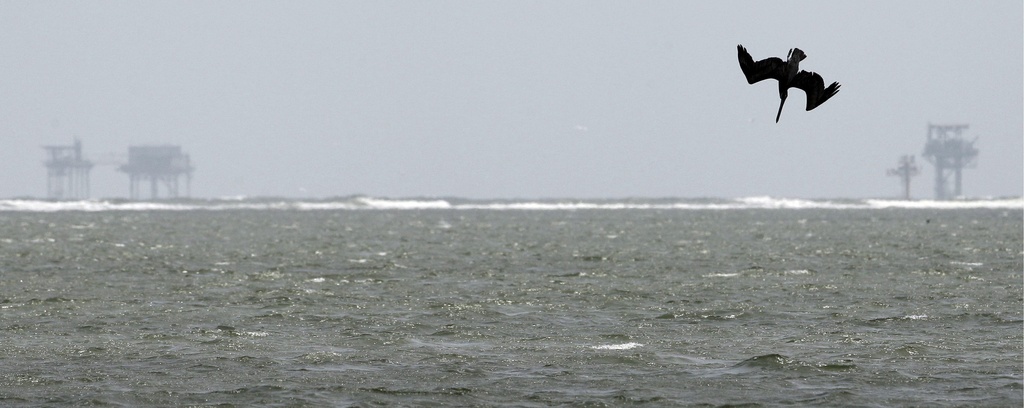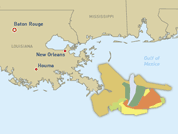
Oil rig owner holds closed-door AGM

The chief executive of Swiss-based drilling contractor Transocean, owner of the Deepwater Horizon rig, has held a closed-door meeting with shareholders.
Steven Newman ignored questions from reporters as he arrived and left the Park Hotel in Zug, a few kilometres from the company’s headquarters.
The Transocean annual general meeting (AGM) came just days after Newman appeared before the United States Congress to explain his company’s involvement in the massive Gulf of Mexico oil spill.
The Deepwater Horizon rig was leased to energy giant BP and exploded on April 20, killing 11 workers and triggering what could become the worst environmental disaster in United States history.
The companies are now throwing the blame at each other.
In a terse statement sent after the Zurich stock market closed on Friday, Transocean said it would distribute some $1 billion (SFr1.13 billion) in dividend to shareholders, or about $3.11 per share.
The company’s stock has lost about a quarter of its value since the oil spill and closed 2.6 per cent lower on the Zurich exchange on Friday at SFr74.10 ($65.60).
BP, whose shares have wiped out $30 billion of market value since April 20, has said the oil spill had cost it $450 million so far. BP shares dropped more than three per cent in London on Friday.
Transocean moved to Switzerland two years ago to protect its low corporate tax rate, and few people in the city had heard of the company, even three weeks after the blast that resulted in up to 15 million litres of oil pouring into the Gulf of Mexico.
Local views
Local resident Boris Zelic expressed surprise that the company with a market capitalization of some $21 billion was based near Zug.
Canton Zug is home to hundreds of international holding companies that pay little or no income tax on their foreign earnings.
Another resident, Dolphi Müller, said he had heard of Transocean but hesitated to blame it for the incident. “It’s probably not their fault. It was a higher power,” he said.
A planned protest by local environmental groups was called off because they didn’t receive police permission to hold a demonstration.
Rupan Sivaganesan from the cantonal Green Party said activists would picket the company’s headquarters in nearby Steinhausen on Saturday.
Jo Lang, a prominent Green politician, said he planned to introduce a motion in parliament calling for any taxes paid by Transocean in Switzerland last year to be donated towards helping those who suffered as a result of the rig disaster.
The amount is likely to be symbolic, as Transocean pays hardly any taxes in Switzerland.
“We want to show that the oil spill in the Gulf reaches all the way to Zug,” Lang said.
Obama anger
Also on Friday US President Barack Obama slammed the companies involved in the slick for a “ridiculous spectacle” of publicly trading blame over the accident.
In comments after a meeting with his Cabinet to discuss efforts to stop the spill and minimise its impact on US Gulf Coast communities, Obama said he was angry and frustrated about the spill, which threatens an ecological and economic disaster.
“You had executives of BP and Transocean and Halliburton [responsible for
cementing the well] falling over each other to point the finger of blame at somebody else,” Obama said.
Obama was referring to testimony on Tuesday on Capitol Hill by leaders of the three companies. None of the three took responsibility for the spill and instead blamed one another.
Obama repeated a demand that BP must pay for the spill’s clean-up and other economic impact on the Gulf region but said the US government would use “every available resource” to stop oil from coming ashore. He said he would not “rest or be satisfied” until the leak was stopped at its source.
Latest efforts
Scientific projections of how much oil has been spewing unchecked for three weeks from the ruptured undersea well has ranged wildly, from BP’s 5,000 barrels (795,000 litres) to 100,000 barrels (15.9 million litres) a day.
Fisheries and tourism, two of the Gulf Coast’s economic mainstays, along with birds, sea turtles and other wildlife, are threatened by the spreading slick. The accident could also cripple attempts in Washington to overhaul US energy policy.
Earlier on Friday undersea robots were trying to thread a small tube into the jagged pipe that is pouring oil into the Gulf of Mexico in BP’s latest attempt to cut down on the spill from a blown-out well.
The company was trying to move the 15-centimetre tube into the leaking 53-centimetre pipe, known as the riser. The smaller tube will be surrounded by a stopper to keep oil from leaking into the sea. BP said it hoped to know by Friday evening if the tube worked and could siphon the oil to a tanker at the surface.
Other efforts over the next few days include deploying a small containment dome, known as a “top hat”, to trap the oil at the site of the leak.
If such short-term efforts fail, it could take 90 days for the company to drill a relief well to cap the ruptured one.
swissinfo.ch and agencies
On April 20, 2010, an explosion and fire killed 11 crew members and destroyed a Transocean-owned semisubmersible drilling rig called Deepwater Horizon, positioned about 50 miles southeast of Venice, Louisiana, in water nearly 5,000 feet deep.
The rig, one of the largest and most sophisticated in the world, had been under contract to BP, the London-based oil giant, since September 2007.
The Deepwater Horizon accident spewed thousands of barrels of oil a day into the Gulf of Mexico, and experts said it could become the largest oil spill in history.
Attempts at the weekend of May 8-9 to cap the well with a giant metal funnel failed.
BP has a new plan to block the well by ramming rubbish into it.
The Gulf of Mexico accounts for one-third of America’s domestic oil production and one-fourth of its natural gas. There are 90 exploratory rigs working there and about 3,500 oil-producing platforms.
Transocean is the world’s largest offshore drilling contractor.
Although it was established in the US, its headquarters have been in the Swiss town of Zug since 2008.
According to its website it has 138 mobile offshore drilling rigs and 20,000 employees world wide.
Its website describes its safety vision as: conducting its operations “in an incident-free workplace, all the time, everywhere”.
Its clients are global energy firms, national petroleum companies and independent contractors.
It constructs wells for both oil and gas all round the world: the Gulf of Mexico and eastern Canada, Brazil, the British and Norwegian sectors of the North Sea, West Africa, Asia, including Australia and India, the Middle East, including Saudi Arabia, and the Mediterranean.
Shares in Transocean fell by 12 % on the Zurich stock exchange on Friday as a result of the oil spill.
Some experts say BP could ask Transocean, the owner of the rig, to help pay for the clean-up operations.
However, BP, as operator of the rig, has accepted responsibility and says it will compensate those who have suffered from the accident.
US President Obama has also said BP is ultimately responsible for the crisis.


In compliance with the JTI standards
More: SWI swissinfo.ch certified by the Journalism Trust Initiative

























You can find an overview of ongoing debates with our journalists here . Please join us!
If you want to start a conversation about a topic raised in this article or want to report factual errors, email us at english@swissinfo.ch.